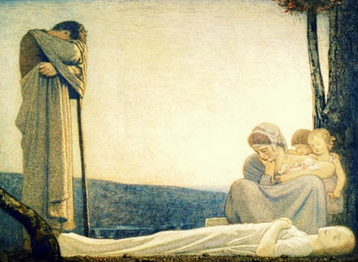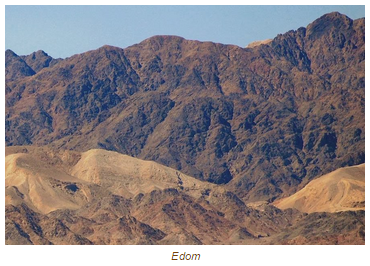ON HIS WAY
After having left Bethel, Jacob kept on going south in
search of his parents, who lived in Hebron. But on his way there, something
happened that brought Jacob both joy and sorrow: Rachel gave birth to her
second child, but she died giving birth to him.
(Genesis 35:16-18) Then they
journeyed from Bethel. When they were still some distance from Ephrath,
Rachel went into labor, and she had hard labor. (17) And when her labor
was at its hardest, the midwife said to her, “Do not fear, for you have another
son.” (18) And as her soul was departing (for she was dying), she called
his name Ben-oni; but his father called him Benjamin.
Before dying, Rachel called her son “Ben-oni” which means: “son
of my sorrows”.
However, Jacob changed his name to “Benjamin” which means:
“son of my right hand”. That is what they used to call the son that served as
his father’s “right hand”; he would stay by his father’s side at all times and
would serve him as his father needed.
(Gen. 35:19-20) So Rachel died,
and she was buried on the way to Ephrath (that is, Bethlehem), (20) and
Jacob set up a pillar over her tomb. It is the pillar of Rachel’s tomb, which
is there to this day.
Rachel died close to Bethlehem. This is a very significant
town in biblical prophecy.
(Micah 5:2) But you, O
Bethlehem Ephrathah, who are too little to be among the clans of Judah, from
you shall come forth for me one who is to be ruler in Israel, whose coming forth is from of old, from ancient
days.
In this town king David was born, and later Jesus was born
here too, who is King of kings and Lord of lords.
THE POWER OF THE
TONGUE
On the day Benjamin was born and Rachel died, two things
that Rachel and Jacob had declared came to pass:
a. Rachel declared that another child would be added.
(Gen. 30:22-24) Then God
remembered Rachel, and God listened to her and opened her womb. (23) She
conceived and bore a son and said, “God has taken away my reproach.” (24) And
she called his name Joseph, saying, “May the LORD add to me
another son!”
b. Jacob declared that whoever had stolen Laban’s idols
should die.
(Gen. 31:30-32) And now you
have gone away because you longed greatly for your father’s house, but why did
you steal my gods?” (31) Jacob answered and said to Laban, “Because I was
afraid, for I thought that you would take your daughters from me by
force. (32) Anyone with whom you find your gods shall not live. In the
presence of our kinsmen point out what I have that is yours, and take it.” Now
Jacob did not know that Rachel had stolen them.
The tongue has power; therefore, we have to be careful with
what we say and declare.
(Proverbs 18:21) Death and life
are in the power of the tongue, and those who love it will eat its fruits.
AT MIGDAL-EDER
After burying Rachel, Jacob continued on his way south in
search of his parents. But before that, he stayed for awhile close to a place
called Migdal-Eder, which means “Tower of the Flock” (Gen. 35:21). He
probably stayed there to tend to his sheep in good pastures.
Unfortunately, there was another tragedy there:
(Gen. 35:22) While Israel
lived in that land, Reuben went and lay with Bilhah his father’s concubine. And
Israel heard of it.
Reuben committed a great sin against God and against his
father which cost him his birthrights.
(Gen. 49:3-4) Reuben, you are
my firstborn, my might, and the firstfruits of my strength, preeminent in
dignity and preeminent in power. (4) Unstable as water, you shall not have
preeminence, because you went up to your father’s bed; then you defiled it—he
went up to my couch!
(1 Chronicles 5:1) The sons of
Reuben the firstborn of Israel (for he was the firstborn, but because he
defiled his father’s couch, his birthright was given to the sons of Joseph the
son of Israel, so that he could not be enrolled as the oldest son
BACK AT HIS FATHER’S
HOUSE
After this happened, Jacob decided not to lose any more time
and go straight to his father’s house. He arrived on time, right before his
father died; as if Isaac was waiting to see his son before he could rest in
peace.
(Gen. 35:27-29) And Jacob came
to his father Isaac at Mamre, or Kiriath-arba (that is, Hebron), where Abraham
and Isaac had sojourned. (28) Now the days of Isaac were 180 years. (29) And
Isaac breathed his last, and he died and was gathered to his people, old and
full of days. And his sons Esau and Jacob buried him.
JACOB’S GENEALOGY
In this chapter we are introduced to Jacob’s genealogy.
(Gen. 35:23-26) The sons of
Leah: Reuben (Jacob’s firstborn), Simeon, Levi, Judah, Issachar, and
Zebulun. (24) The sons of Rachel: Joseph and Benjamin. (25) The sons
of Bilhah, Rachel’s servant: Dan and Naphtali. (26) The sons of Zilpah, Leah’s
servant: Gad and Asher. These were the sons of Jacob who were born to him in
Paddan-aram.
The last time when the Lord had repeated the promise of
“land and descendants” (zera v’aretz), Jacob
had been in Bethel. [Gen. 12:1-7, 13:14-16, 15:18, 17:7-8, 26:1-5, 28:13].
Unlike Abraham and Isaac, ALL sons of Jacob were chosen to make up the divine
nation.
Here is where the selection process ends, which means that
all the sons of Israel will be chosen for the divine promise. All the sons of
Jacob will become a nation that will be called ISRAEL.
God promised Jacob that his descendants would be “a NATION
and a COMPANY OF NATIONS”. Out of his sons would come a nation (the Jewish
people, descendants of Judah, Benjamin and Levi) and a company of nations (the gentile
believers, of the 10 lost tribes that were assimilated to the nations).
(Gen 35:11) And God said to
him, “I am God Almighty: be fruitful and multiply. A nation and a company
of nations shall come from you, and kings shall come from your own body.
ESAU’S GENEALOGY
In chapter 36 we find Esau’s genealogy. He joined himself
with two Hittite women, and then with one of Ishmael’s daughters.
(Gen. 36:2-3) Esau took his
wives from the Canaanites: Adah the daughter of Elon the Hittite, Oholibamah
the daughter of Anah the daughtera of Zibeon
the Hivite, (3) and Basemath, Ishmael’s daughter, the sister of Nebaioth.
Since his marriage with the Canaanite women was unequally
yoked, it strained the relationship with his parents.
(Gen. 26:34-35) When Esau was
forty years old, he took Judith the daughter of Beeri the Hittite to be his
wife, and Basemath the daughter of Elon the Hittite, (35) and they made
life bitter for Isaac and Rebekah.
As if this was not enough, Esau later married the daughter
of Ishmael, with whom Isaac had had conflict during his childhood.
(Gen. 28:8-9) So when Esau
saw that the Canaanite women did not please Isaac his father, (9) Esau
went to Ishmael and took as his wife, besides the wives he had, Mahalath the
daughter of Ishmael, Abraham’s son, the sister of Nebaioth.
The text does not say if Esau did it on purpose, to get back
at his parents, or if he did it simply out of lack of discernment. But the fact
is that these unequal marriages forced a greater distance between Esau and his
family.
One of the most prominent descendents of Esau is Amalek, illegitimate son of Esau’s
firstborn, Eliphaz (Gen. 36:12).
Amalek’s descendents have had an eternal war against the
Israelites. When the Israelites left Egypt, the Amalekites attacked them on the
way to Mount Sinai. This attack was without reason, since they didn’t even go
close to where they live. Not only that, but they attacked the weakest ones,
the children and the elders. Many years later, a descendent of Amalek, called
Haman, tried to annihilate all the Jews that lived in Persia during the times
of Ester, but God saved them miraculously.
Since the beginning, God was against Amalek because of what
he did to Israel. The Lord was determined that there would be a day in which he
would erase the name of Amalek for having an anti-Israel spirit.
(Exodus 17:14-16) Then
the LORD said to Moses, “Write this as a memorial in a book and recite
it in the ears of Joshua, that I will utterly blot out the memory of Amalek
from under heaven.” (15) And Moses built an altar and called the name of
it, The LORD Is My Banner, (16) saying, “A hand upon the
throne of the LORD! The LORD will have war with Amalek from
generation to generation.”
ESAU LEFT THE
PROMISED LAND
After Isaac’s death, Esau decided not to stay in the
Promised Land.
(Gen. 36:6-8) Then Esau took
his wives, his sons, his daughters, and all the members of his household, his livestock,
all his beasts, and all his property that he had acquired in the land of
Canaan. He went into a land away from his brother Jacob. (7) For their
possessions were too great for them to dwell together. The land of their
sojournings could not support them because of their livestock. (8) So Esau
settled in the hill country of Seir. (Esau is Edom.)
The reason for which Esau left the Promised Land is very
similar to Lot’s reason for leaving when he separated himself from Abraham to
search for “better pastures”, ending up in Sodom. Even as an adult, it is
obvious that Esau still rejects the inheritance that God had given to them.




Comments
Post a Comment